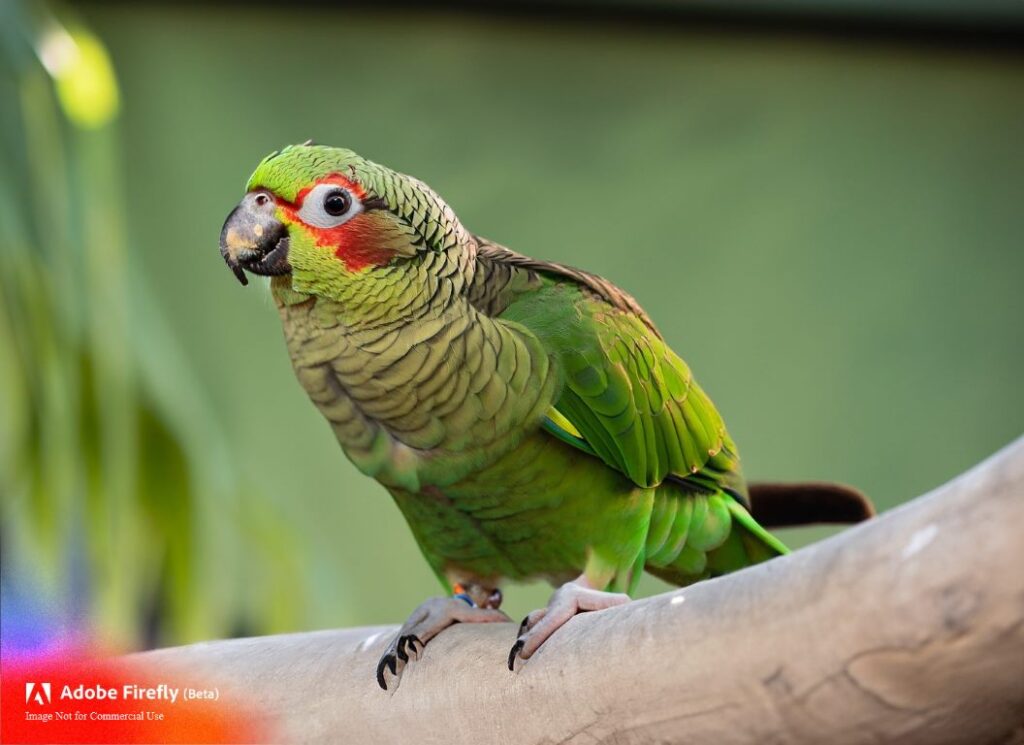
Parrots have a remarkable ability to mimic human speech. Especially the Quaker parrots, who are known for their engaging personalities and highly talkative nature. But have you ever wondered from what age parrots start talking? Come, let’s find out.
Quaker parrots, aka Monk parakeets, talk a lot. They are, in fact, one of the most talkative parrots. Quakers are known for their inquisitive nature and charming personalities. One of the exciting traits that makes them different from others is the potential to talk. Join us as we explore the vocal development of Quaker parrots and understand their delightful creatures. Whether you’re a seasoned bird owner or considering bringing a Quaker parrot into your home, this article has a wealth of knowledge for you.
Do Quaker Parrots Talk?
Quaker parrots, also known as Monk parakeets, are known for their ability to talk. Many Quaker parrots have the potential to mimic human speech and other sounds; however, all of them don’t need to talk. Quaker parrots do talk, but to what extent depends on an individual bird.
Factors like age, temperature, social interaction, and training can influence Quaker parrots’ talking ability. Quaker parrots who aren’t exposed to human speech often may not talk. However, the ones exposed to human speech and interaction from a young age are more likely to develop talking skills. However, it is worth noting that every Quaker parrot can have its own speech pattern and preference that can be unique from others. Some Quaker parrots may be more proficient talkers than others, and the quality of their speech can vary.
Overall, Quaker parrots can talk, but to what degree can they differ amongst individual birds?

At What Age Does Quaker Parrots Start Talking?
The age when Quaker parrots start talking widely ranges among individuals. Usually, Quaker parrots start vocalizing at an early stage of 2 to 3 months of age. Slowly, they attempt to mimic sounds as well. Most likely, a Quaker parrot will start vocalizing in 6 months.
These parrots start talking or making sounds at a younger age. However, much of it depends on individual parrots’ personality, socialization, and exposure to human speech and sound. Some Quaker parrots may also take longer to develop their vocal abilities.
For your Quaker parrot to start vocalizing early, it is important to begin interacting and talking with them when they are 1 or 2 months old. Positive reinforcement from a young age will help develop their talking behavior.
However, remember that not all Quaker parrots will become proficient talkers, and some may have a limited vocabulary or prefer making other sounds, such as whistles or chirps. Individual variation in speech development is entirely normal among these birds.
How Well Do Quaker Parrots Talk?
Quaker Parrots, aka Monk Parakeets, have impressive talking abilities. While some Quaker parrots have the potential to become excellent talkers, others may have a more limited vocabulary or may not talk at all.
Here are some factors that can influence how well Quaker parrots talk:
- Individual Variation: Like humans, each Quaker parrot has its unique personality and aptitude for learning to talk. Some of them are more naturally inclined to mimic sounds and words, while others may find it more challenging.
- Socialization: Quaker parrots who are raised in a social and interactive environment from a young age tend to have better speech development. Parrots with regular exposure to human speech and interaction are more likely to pick up words and phrases.
- Training and Repetition: Training plays a crucial role in teaching a Quaker parrot to talk. Consistent and patient training, where you repeat words and phrases, can help them learn to mimic human speech more effectively.
- Age: The age at which a Quaker parrot is introduced to speech training can impact their ability to talk. Parrots exposed to training at a younger age may have an advantage in developing their talking skills.
- Vocabulary and Clarity: Some Quaker parrots may have a larger vocabulary and clearer pronunciation than others. The extent of their speech abilities can vary from simple words and phrases to more complex sentences.
- Environmental Factors: The environment in which a Quaker parrot lives can also affect its speech development. A calm and quiet setting is more suitable for conductive learning and speech practicing.
It’s essential to keep in mind that not all Quaker parrots will become proficient talkers. Based on their individual personality and lifestyle, a few may have a limited vocabulary or prefer making other sounds, such as whistles or chirps. The key is to be patient, provide positive reinforcement, and enjoy your Quaker parrot’s unique vocalizations and personality, whether or not they become expert talkers.
Sounds That Quaker Parrots Can Make
Quaker parrots have diverse vocalizations, and these avians are quite capable of making a variety of sounds.
Some of the popular sounds you may hear around Quaker Parrots include:
- Talking and Mimicking: Quaker parrots mimic human speech and other sounds unlike many birds. You can hear them repeating words, phrases and sometimes even an entire sentence. However, the clarity and extent of their mimicry can vary from bird to bird.
- Whistling: Quaker parrots are adept at whistling tunes and melodies. These avians can mimic different whistling sounds or may even create their own.
- Chirping: Like all parakeets, Quaker parrots are known for their cheerful chirping. They chirp around to express excitement or happiness and even to communicate.
- Squawking: Quaker parrots may emit loud squawking sounds when they are alarmed or feel threatened. It is their way of warning others or indicating distress.
- Clicking and Clucking: Quaker parrots may produce clicking or clucking sounds as a form of communication. They do so, especially when they are interacting with other birds or humans.
- Imitating Environmental Sounds: Quaker parrots are known to imitate sounds from their environment. It can mimic the telephone ring, doorbell or even a barking dog.
- Laughing and Chuckling: Some Quaker parrots have a playful side and can imitate laughter or chuckling sounds, which can be quite endearing.
- Singing: Quaker parrots may sing songs or melodies, and their musical abilities can vary. Some may have a talent for singing, while others may not sing as frequently.
It’s important to note that the sounds a Quaker parrot makes can vary based on their individual personality and experiences. The more socialization and exposure to various sounds they have, the more diverse their vocalizations may become.
Can You Teach an Older Quaker Parrot to Talk?
Yes, it is possible to teach parrots to talk, and Quaker parrots are no exception. However, teaching an older Quaker parrot talk may require more patience and persistence compared to teaching a younger bird.
Here are some steps and tips for teaching speech to an older Quaker parrot:
- Assess the Bird’s Health: Before you begin any training, ensure that your older Quaker parrot is in good health. Medical concerns sometimes can affect their ability to produce mimic sounds.
- Create a Calm Environment: Choose a quiet and comfortable space for training sessions. Minimize distractions and make sure the bird feels relaxed and safe.
- Start with Familiar Words: Begin with words or phrases that the parrot might already be familiar with. Use words like Hello, Good Morning, Beautiful, etc. and repeat them consistently.
- Use Positive Reinforcement: Reward the parrot with treats, praise, or attention when it attempts to mimic or say words correctly. Positive reinforcement encourages the bird to continue trying.
- Be Patient: Older birds may take longer to pick up new words or sounds; thus, we are patient with them.
- Repeat and Repetition: Practice regularly, but keep training sessions short and enjoyable. Overloading the bird with lengthy sessions can be counterproductive.
- Model Pronunciation: Clearly and slowly pronounce words and phrases you want the parrot to learn. Be a good model for pronunciation.
- Use Natural Conversations: Include the bird in your daily conversations. Talk to them not like you are taking a class but as a regular conversation. Say Hello or Good Morning to the parrot as you pass by daily.
- Record Your Voice: Some older Quaker parrots respond well to hearing recorded human speech.
- Interact Socially: Spend quality time with your parrot. Try to communicate with them with love and interest to form a bond.
- Respect Individual Limits: Recognize that not all Quaker parrots will become proficient talkers, and some may have limitations in their speech abilities.
Tips for Encouraging Speech in Quaker Parrots
Encouraging speech in Quaker Parrots can be a rewarding endeavor. Here are some tips to help you effectively encourage speech in your Quaker parrot:
- If possible, begin speech training when the Quaker parrot is still young, as they tend to be more receptive to learning at an early age.
- Select a quiet and comfortable location for training sessions.
- Reward your parrot with treats, praise, or attention when it attempts to mimic sounds or words.
- Quaker parrots may take time to pick up words and sounds. However, remember consistency is the key, so maintain a regular training schedule.
- Short but frequent sessions are more effective than infrequent, lengthy ones.
- Start with basics, and do not jump into long and confusing words/ sentences very early.
- Pronounce words and phrases clearly and slowly.
- Associate words with specific situations to help them understand the context. For instance, say, “Look how PRETTY that flower is”.
- Some parrots respond well to hearing recorded human speech; thus, consider using recorded voice.
- Incorporate interactive toys or games into training sessions, including puppets, mirrors or more.
Bottom Line…
Overall, how long it takes a Quaker Parrot to talk depends upon the bird and your collective efforts. The earlier you will start talking to them, the early they will catch and develop a habit.

Hi, There and Welcome to BirdsNews.com, is here to help you learn and care about pet birds. and this blog is a journal of everything I’ve learned.
